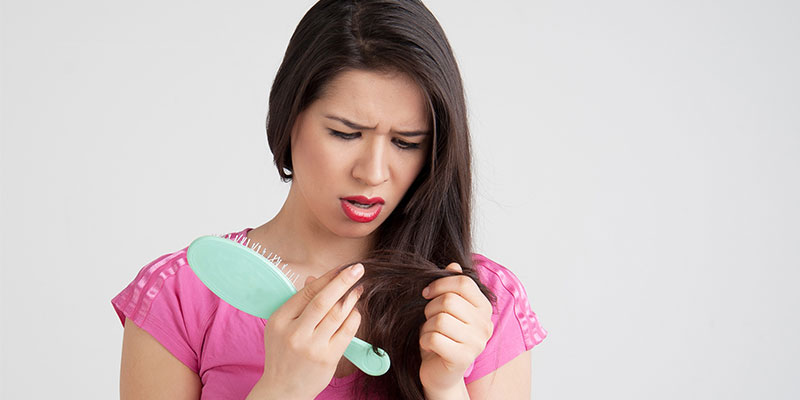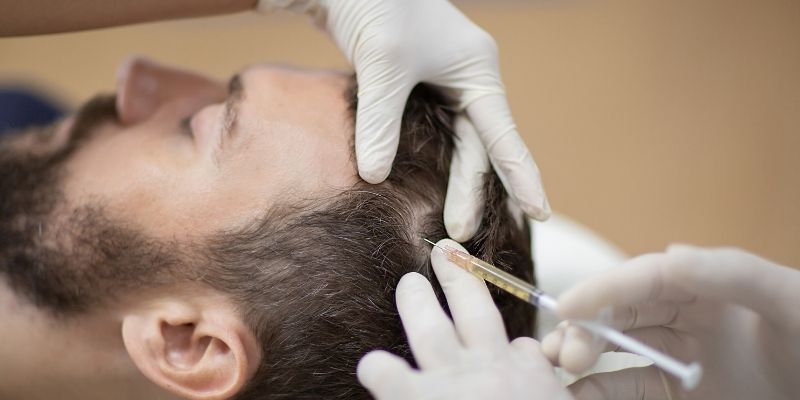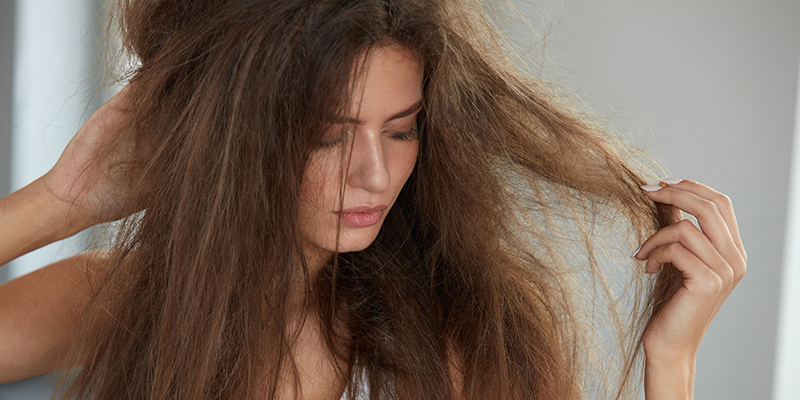Causes Of Hair Loss In Teenagers: Treatment And Prevention
Hair loss is a common problem faced by everyone; from adults to teenagers. While hair loss is common among adults, it is not a common occurrence in teenagers as the vitality of hair growth is considered to be quite stable during this age. However, there are possibilities of a teenager experiencing hair fall due to an underlying medical condition or various external conditions. Hair loss is a condition wherein certain factors stop the growth of hair, or there is an increase in shedding or breakage. If you notice that you are shedding more than normal, then it is advised to consult a dermatologist who can find the root cause and suggest the right treatment for your hair loss problem.
In This Article Show

Causes of Hair Loss With Male Teenagers
When it comes to balding, we usually visualize older men. But there is a high possibility of teenage boys also experiencing hair loss. If you have noticed that you are shedding excessive hair, it can be an indicator of an underlying health.
Below are some of the major causes of hair loss in teenage males:
- Improper diet – An improper diet is one of the major causes of teenage hair fall as the hair roots become weak due to the lack of proper nutrition.
- Ringworm of the scalp – It is a fungal infection on the scalp, and is also known as tinea capitis which can cause patchy hair loss if not treated in time.
- Alopecia Areata – There are cases where teens can suffer from alopecia areata which in turn causes patchy and rapid hair loss. Approximately 20% of people diagnosed are under 16 years of age.
- Medical conditions – Diabetes, thyroid, lupus, etc., are some of the medical conditions which can cause hair loss. However, these medical conditions are not common in teenagers.
- Trichotillomania – This is a rare psychological condition where an individual has an irresistible urge to pull their hair. As a result, bald patches start developing on the scalp. This condition is more common with girls than boys, although cases do exist.
- Traction Alopecia – This is a condition which causes hair fall when your hair is pulled in a particular direction for a very long time. Putting up your hair in tight ponytails all the time is one such case.
- Androgenetic Alopecia – Also known as male pattern baldness, it is a condition which results in gradual and permanent hair loss from the scalp. For some, this condition can begin during their teenage years as well. However, it is not a very common cause with just 16% of the boys in the age group of 15-17 years getting affected by it.
- Medicines/Drugs – Certain drugs can cause hair loss as a side effect, like anti-cancer drugs, vitamin A derivatives, antihyperlipidemic drugs, antiepileptic drugs etc. as these medicines contain amphetamines which trigger hair loss in teens. However, these diseases are not common among teenage boys.
- Hair Styles and Products – Using hair styling products can trigger hair loss as they contain harsh chemicals.
- Stress – Any physical or emotional stress can trigger the problem of hair fall.
- Dandruff – In some cases, dandruff can aggravate a hair loss condition. Sometimes infections also crop up with dandruff; which can increase hair shedding.
Must Read: Best Hair Loss Treatments
Common Causes of Hair Loss With Female Teenagers
There are a number of causes of hair loss in teenage females, such as:0
- Hormonal imbalance – During puberty, hormones trigger immense bodily changes and some teenage girls may even face hair loss.
- Medicines/drugs – Drugs like oral retinoids for acne, oral contraceptive withdrawal etc. can cause hair loss.
- Over styling – Hairstyles that cause too much pressure on hair strands result in hair loss. Chemicals such as paraphenylene diamine (PPD) or ammonia present in hair dyes have an adverse effect on the hair. They can cause allergic dermatitis of the scalp which leads to hair loss.
- Improper diet – The lack of a nutritious diet also affects the strength of your hair. Eating a healthy diet with all the necessary nutrients is important for health and wellness and in turn preventing hair loss.
- Natural conditions – Pollution, excessive exposure to the sun, the lack of adequate moisture during extreme seasons, etc., can also contribute to hair loss in teenage girls.
Early Signs of Teenage Hair Loss
Detecting the problem of hair loss in its early stages will increase the chances of it being resolved. Here are some of the early signs and symptoms of teenage hair loss:
- Receding Hairline (Males) – A receding hairline is a condition where you start losing hair from the temple region. It is also known as a widow’s peak.
- Thinning Crown (Females) – With females, the thinning of hair begins at the crown. It may not be too noticeable initially, but closer inspection will reveal that your scalp is more visible in the crown area.
- Itchy and Flaky Scalp – An itchy and flaky scalp and hair loss are not directly related. However, conditions like dandruff, seborrheic dermatitis can cause hair loss.
- Thin Hair Regrowth – During the early stages of hair loss, you will notice some hair regrowth after the initial shedding. However, this regrown hair will be much thinner and more wispy, gradually becoming shorter as well.
Teenage Hair Loss Treatments
When it comes to teenage hair fall solutions and treatments, the age factor plays a major role as not every treatment is suitable for teenagers. Teenagers suffering from hair loss can be prescribed medication, procedural treatments, or a combination of both.
Listed below are some effective treatments which can help resolve the problem of teenage hair loss.
- PRP: Platelet-rich plasma is a non-invasive and therapeutic treatment for hair re-growth and restoration, naturally. It is considered one of the safest and most effective treatments available for various kinds of hair loss. A blood sample is collected and is processed via a centrifuge. This centrifugation process separates the platelets from plasma and enriches them with protein-rich growth factors. This rich concoction is then injected back into the scalp (using tiny needles) with scanty hair growth, to stimulate the dormant stem cells. This enables natural hair re-growth and restoration for teenagers. The minimum age required for this treatment is 18 years.
- Minoxidil: It is a USFDA approved drug treating hair loss in women and men which is known to increase hair regrowth. It comes in liquid or foam form and has certain directions for use, that must be adhered to, as there are certain side effects like scalp irritation, unwanted hair growth (if it comes into contact with other areas). This medication can be used by both; teenage boys and girls.
- Finasteride: It is a US-FDA approved drug for men that help in slowing hair loss. The dosage and directions for use must be kept in mind as there are side effects if used improperly. This drug cannot be used by women, irrespective of their age. Also, it is approved for men who are above the age of 18 years.
- Oral contraceptives: Birth control pills are sometimes prescribed to help treat a hair fall condition when associated with a hormonal imbalance while also treating any existing acne.
- Low-level laser therapy: The US-FDA approves LLLT for men and women suffering from hereditary hair loss. It may improve hair density but there may not be a long term impact, as there is no factual evidence to support it.
Prevention (General Tips)
The preventive measures listed below can help in avoiding and dealing with your teenage hair fall problems:
- Use a mild shampoo and wash your hair regularly to keep your scalp clean.
- Do not brush your hair immediately after washing, as wet hair is more prone to breakage.
- Use suitable hair products for your skin and hair type, and when in doubt, take the opinion of your dermatologist.
- Enrich your diet with more protein and fresh greens.
- Keep yourself hydrated and maintain hygiene.
- Check your fitness gear and wear airier clothes to manage the excess sweat. Shower soon after workouts to prevent any sweat deposits.
- Keep stress away, and try to follow a proper fitness routine with a good 8 hours of sleep each night to ward off stress.
- Check your medication and get health examinations, for any drug which may be causing hair fall. Discuss an alternative with your doctor.
- Do not apply excess pressure while combing, drying or styling your hair.
- Avoid using hairdryers, straighteners and hair dyes, as the heat may damage your hair.
Hair loss is a common concern for people of all ages even as early as their teenage years. With fast-paced lives, exposure to pollution and UV rays from the sun being unavoidable, we tend to overestimate our hair care routine. A check on your diet, fitness, hygiene and health can help you treat and prevent hair loss. Be sure to visit your dermatologist when you see the warning signs and prevent permanent damage to your hair.
Frequently Asked Questions
Yes, in some cases, it can be. While many instances are temporary and caused by stress, hormonal changes, or poor diet, hair loss can also be an indicator of underlying issues such as thyroid problems, lupus, or alopecia areata, an autoimmune disease. It’s always best to consult a doctor to rule out a medical cause.
Hormonal changes during puberty can affect hair growth cycles, leading to temporary thinning or shedding. This is often normal and resolves on its own. However, if the hair loss is significant or persistent, it’s a good idea to seek a professional opinion.
The most common cause is often androgenetic alopecia, or male pattern baldness, which can start in the late teens. This is a genetic condition where hair follicles are sensitive to hormones, leading to a receding hairline or thinning at the crown.
A lack of essential nutrients is a major contributor to hair loss in teens. Deficiencies in iron, zinc, biotin, and certain vitamins are crucial for hair health, and not getting enough of them can disrupt the hair growth cycle and cause hair to become brittle and fall out.
Absolutely. Physical and emotional stress can trigger a temporary condition called telogen effluvium. This causes a significant portion of hair follicles to enter a resting phase prematurely, leading to increased shedding a few months after the stressful event.
Tight hairstyles like braids, ponytails, or buns can cause traction alopecia, a type of hair loss from constant pulling on the hair follicles. Additionally, excessive heat styling, chemical treatments, and harsh hair products can weaken hair strands, causing them to break more easily.










